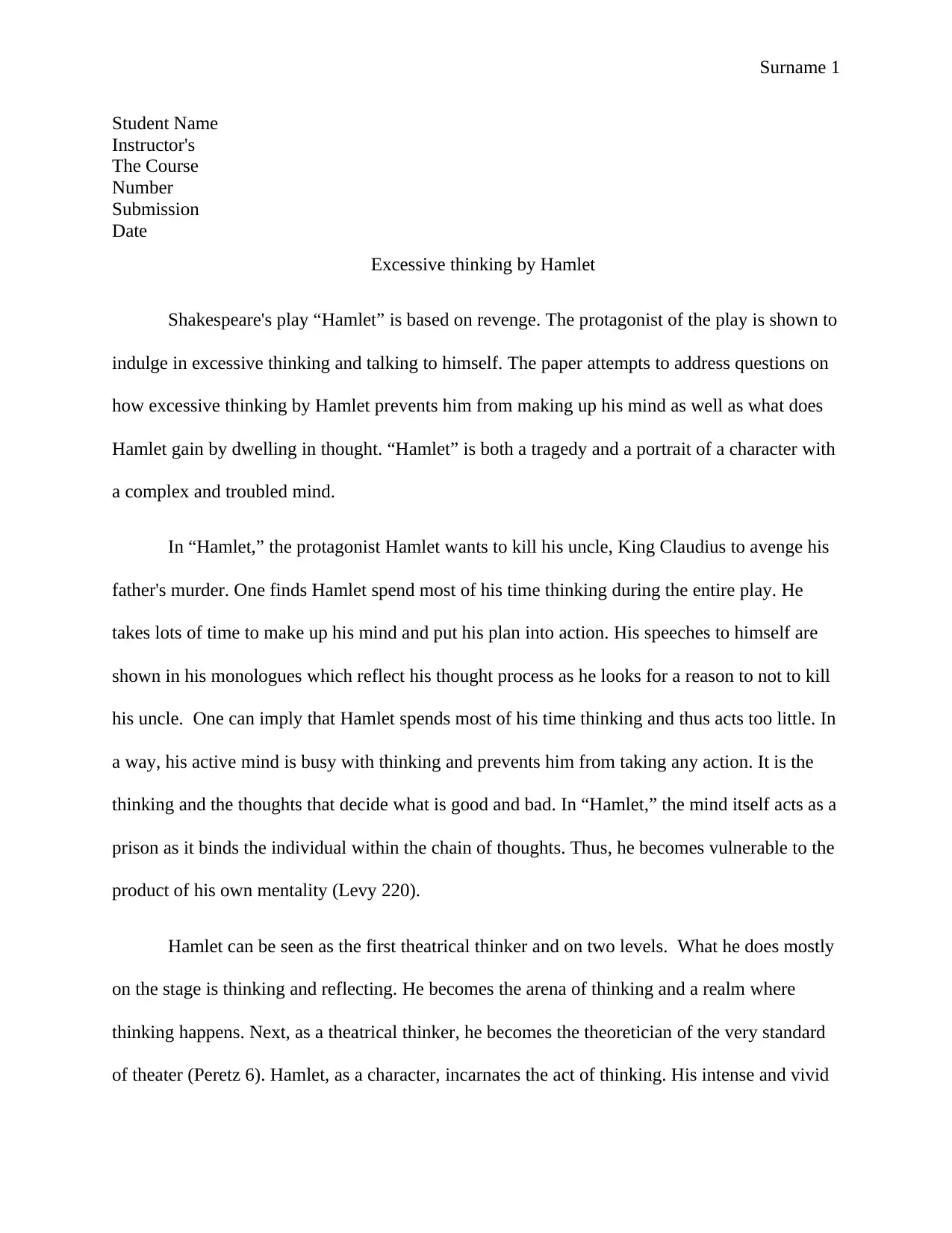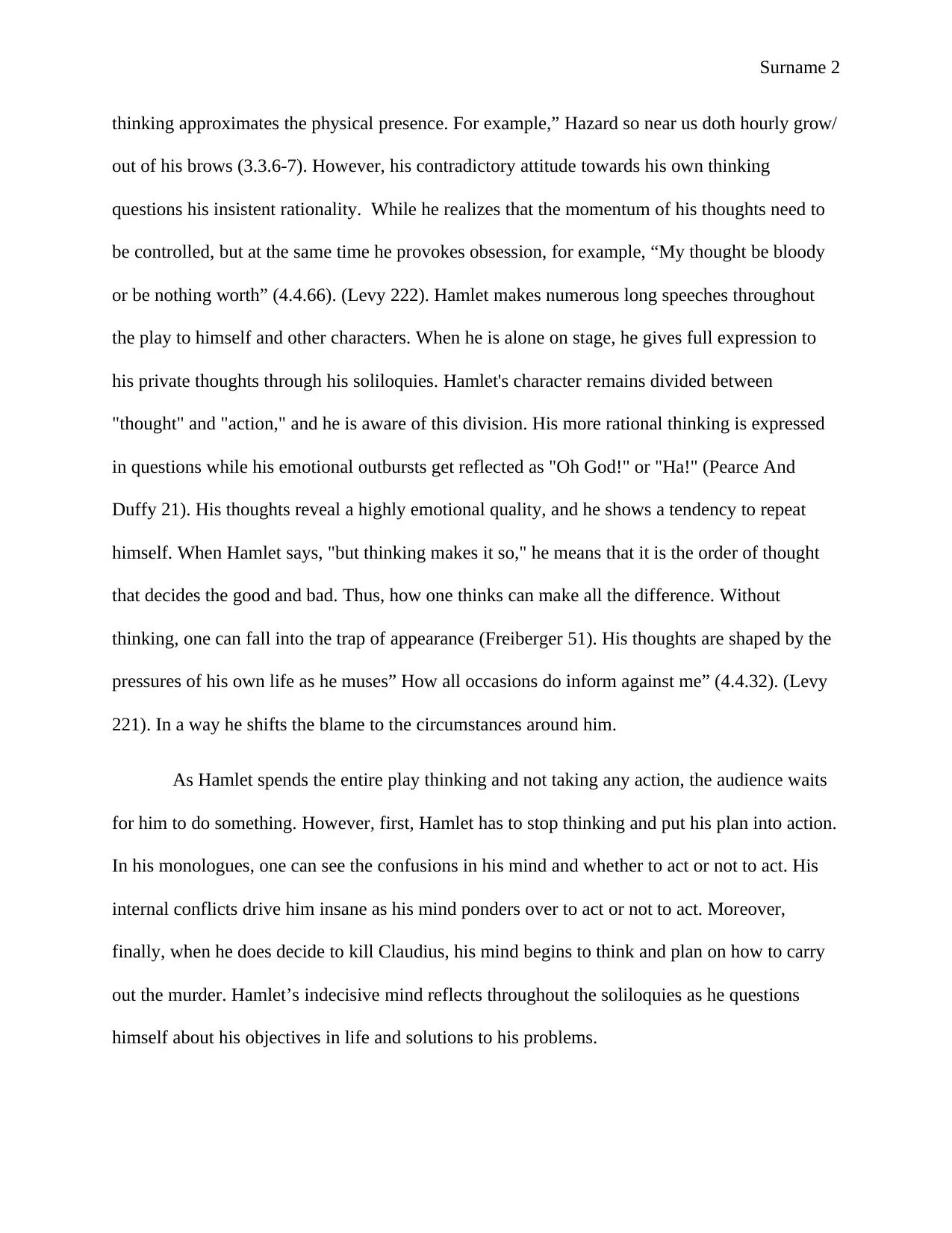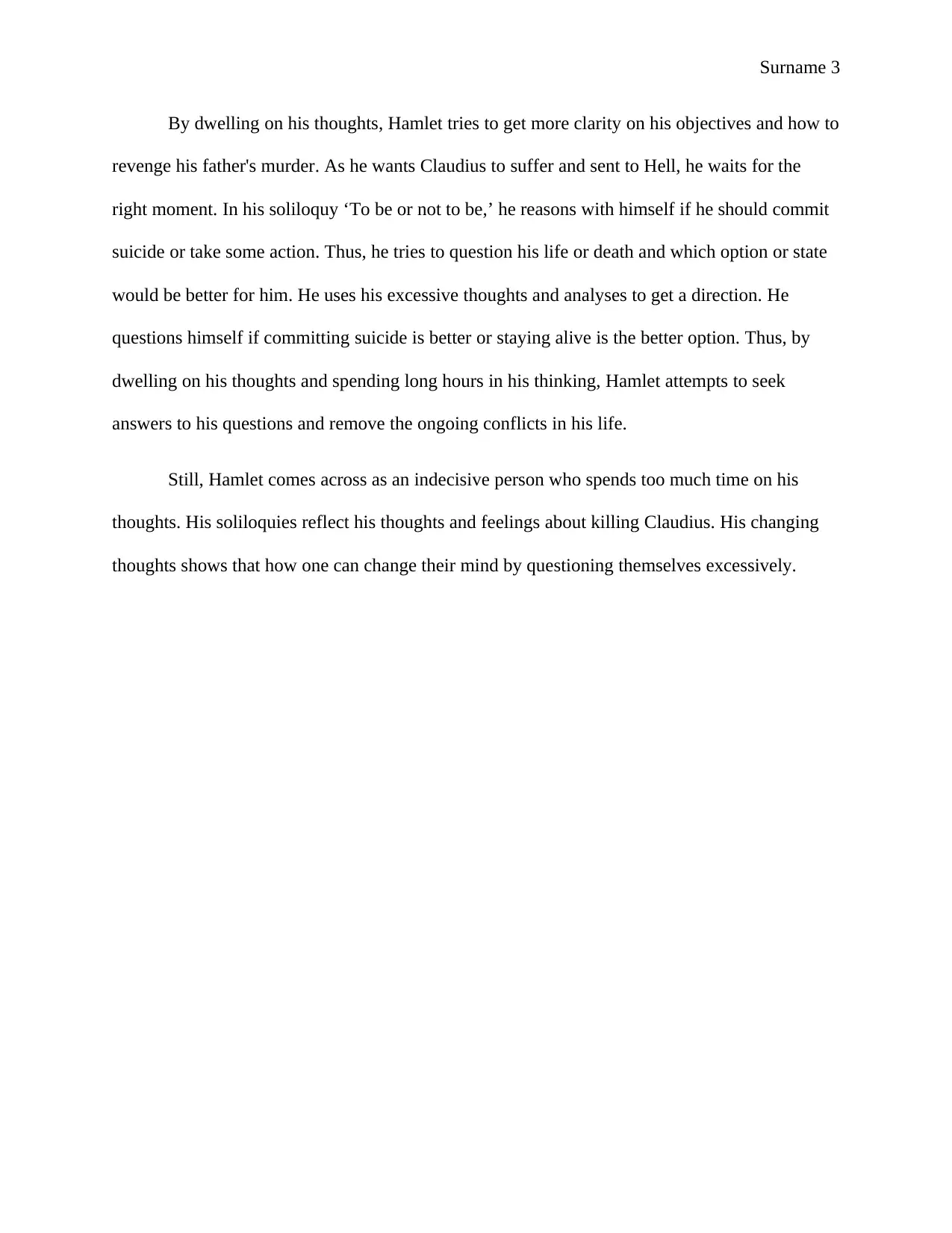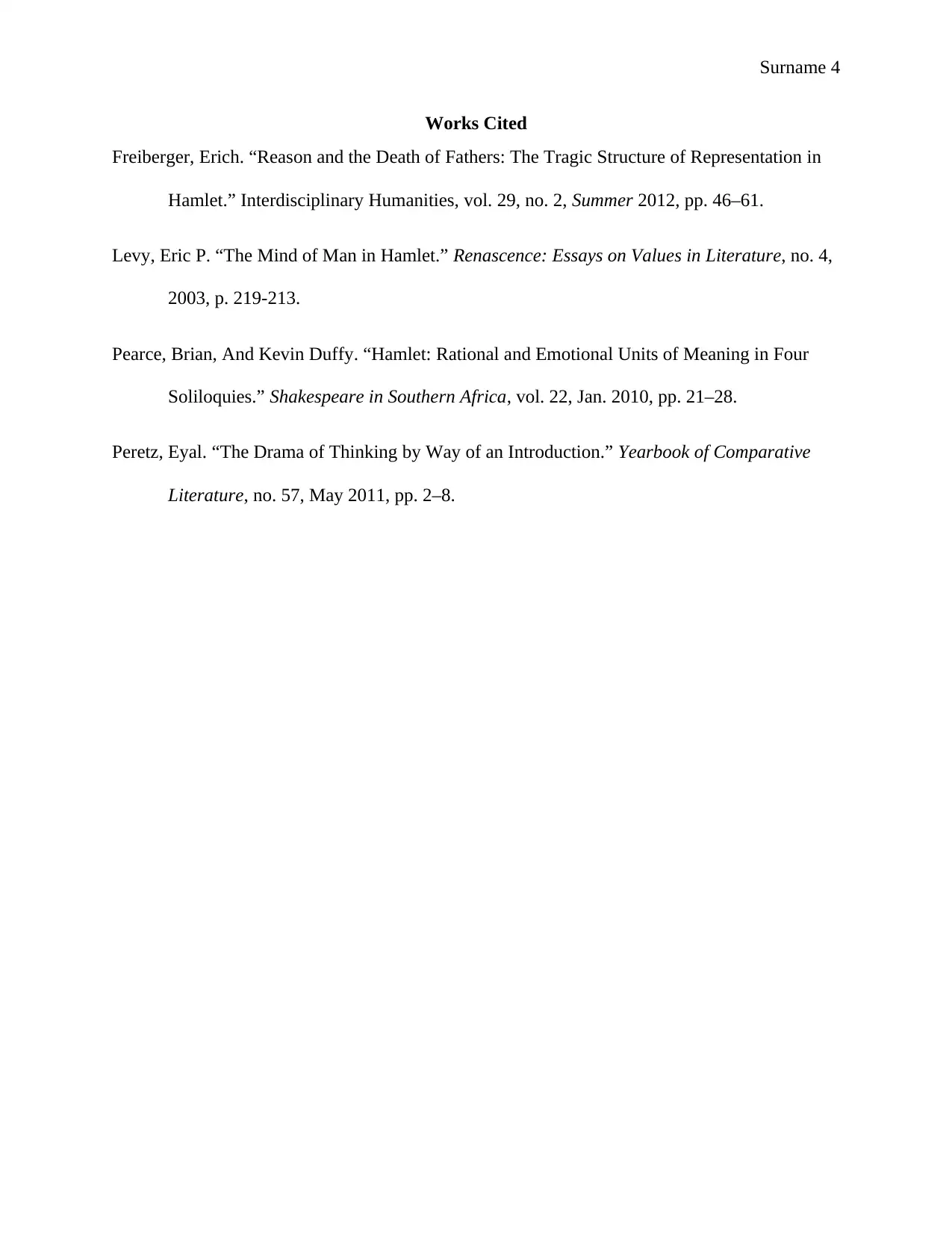Hamlet's Excessive Thinking and Its Consequences in Shakespeare's Play
VerifiedAdded on 2023/04/24
|4
|1095
|365
Essay
AI Summary
This essay delves into the complexities of Hamlet's character, focusing on his tendency towards excessive thinking and its ramifications within Shakespeare's tragedy. The paper explores how Hamlet's overthinking prevents him from decisive action, particularly in his quest for revenge against King Claudius for his father's murder. It examines his introspective soliloquies, which reveal his internal conflicts, indecisiveness, and the struggle between thought and action. The essay analyzes the impact of his prolonged contemplation on his ability to fulfill his objectives, the consequences of his mental state, and how his mind acts as both a tool and a prison. Furthermore, it references critical analyses by scholars such as Levy, Pearce, and Freiberger to support its arguments. Ultimately, the essay highlights the central role of Hamlet's thinking in shaping his character and driving the play's narrative.

Surname 1
Student Name
Instructor's
The Course
Number
Submission
Date
Excessive thinking by Hamlet
Shakespeare's play “Hamlet” is based on revenge. The protagonist of the play is shown to
indulge in excessive thinking and talking to himself. The paper attempts to address questions on
how excessive thinking by Hamlet prevents him from making up his mind as well as what does
Hamlet gain by dwelling in thought. “Hamlet” is both a tragedy and a portrait of a character with
a complex and troubled mind.
In “Hamlet,” the protagonist Hamlet wants to kill his uncle, King Claudius to avenge his
father's murder. One finds Hamlet spend most of his time thinking during the entire play. He
takes lots of time to make up his mind and put his plan into action. His speeches to himself are
shown in his monologues which reflect his thought process as he looks for a reason to not to kill
his uncle. One can imply that Hamlet spends most of his time thinking and thus acts too little. In
a way, his active mind is busy with thinking and prevents him from taking any action. It is the
thinking and the thoughts that decide what is good and bad. In “Hamlet,” the mind itself acts as a
prison as it binds the individual within the chain of thoughts. Thus, he becomes vulnerable to the
product of his own mentality (Levy 220).
Hamlet can be seen as the first theatrical thinker and on two levels. What he does mostly
on the stage is thinking and reflecting. He becomes the arena of thinking and a realm where
thinking happens. Next, as a theatrical thinker, he becomes the theoretician of the very standard
of theater (Peretz 6). Hamlet, as a character, incarnates the act of thinking. His intense and vivid
Student Name
Instructor's
The Course
Number
Submission
Date
Excessive thinking by Hamlet
Shakespeare's play “Hamlet” is based on revenge. The protagonist of the play is shown to
indulge in excessive thinking and talking to himself. The paper attempts to address questions on
how excessive thinking by Hamlet prevents him from making up his mind as well as what does
Hamlet gain by dwelling in thought. “Hamlet” is both a tragedy and a portrait of a character with
a complex and troubled mind.
In “Hamlet,” the protagonist Hamlet wants to kill his uncle, King Claudius to avenge his
father's murder. One finds Hamlet spend most of his time thinking during the entire play. He
takes lots of time to make up his mind and put his plan into action. His speeches to himself are
shown in his monologues which reflect his thought process as he looks for a reason to not to kill
his uncle. One can imply that Hamlet spends most of his time thinking and thus acts too little. In
a way, his active mind is busy with thinking and prevents him from taking any action. It is the
thinking and the thoughts that decide what is good and bad. In “Hamlet,” the mind itself acts as a
prison as it binds the individual within the chain of thoughts. Thus, he becomes vulnerable to the
product of his own mentality (Levy 220).
Hamlet can be seen as the first theatrical thinker and on two levels. What he does mostly
on the stage is thinking and reflecting. He becomes the arena of thinking and a realm where
thinking happens. Next, as a theatrical thinker, he becomes the theoretician of the very standard
of theater (Peretz 6). Hamlet, as a character, incarnates the act of thinking. His intense and vivid
Paraphrase This Document
Need a fresh take? Get an instant paraphrase of this document with our AI Paraphraser

Surname 2
thinking approximates the physical presence. For example,” Hazard so near us doth hourly grow/
out of his brows (3.3.6-7). However, his contradictory attitude towards his own thinking
questions his insistent rationality. While he realizes that the momentum of his thoughts need to
be controlled, but at the same time he provokes obsession, for example, “My thought be bloody
or be nothing worth” (4.4.66). (Levy 222). Hamlet makes numerous long speeches throughout
the play to himself and other characters. When he is alone on stage, he gives full expression to
his private thoughts through his soliloquies. Hamlet's character remains divided between
"thought" and "action," and he is aware of this division. His more rational thinking is expressed
in questions while his emotional outbursts get reflected as "Oh God!" or "Ha!" (Pearce And
Duffy 21). His thoughts reveal a highly emotional quality, and he shows a tendency to repeat
himself. When Hamlet says, "but thinking makes it so," he means that it is the order of thought
that decides the good and bad. Thus, how one thinks can make all the difference. Without
thinking, one can fall into the trap of appearance (Freiberger 51). His thoughts are shaped by the
pressures of his own life as he muses” How all occasions do inform against me” (4.4.32). (Levy
221). In a way he shifts the blame to the circumstances around him.
As Hamlet spends the entire play thinking and not taking any action, the audience waits
for him to do something. However, first, Hamlet has to stop thinking and put his plan into action.
In his monologues, one can see the confusions in his mind and whether to act or not to act. His
internal conflicts drive him insane as his mind ponders over to act or not to act. Moreover,
finally, when he does decide to kill Claudius, his mind begins to think and plan on how to carry
out the murder. Hamlet’s indecisive mind reflects throughout the soliloquies as he questions
himself about his objectives in life and solutions to his problems.
thinking approximates the physical presence. For example,” Hazard so near us doth hourly grow/
out of his brows (3.3.6-7). However, his contradictory attitude towards his own thinking
questions his insistent rationality. While he realizes that the momentum of his thoughts need to
be controlled, but at the same time he provokes obsession, for example, “My thought be bloody
or be nothing worth” (4.4.66). (Levy 222). Hamlet makes numerous long speeches throughout
the play to himself and other characters. When he is alone on stage, he gives full expression to
his private thoughts through his soliloquies. Hamlet's character remains divided between
"thought" and "action," and he is aware of this division. His more rational thinking is expressed
in questions while his emotional outbursts get reflected as "Oh God!" or "Ha!" (Pearce And
Duffy 21). His thoughts reveal a highly emotional quality, and he shows a tendency to repeat
himself. When Hamlet says, "but thinking makes it so," he means that it is the order of thought
that decides the good and bad. Thus, how one thinks can make all the difference. Without
thinking, one can fall into the trap of appearance (Freiberger 51). His thoughts are shaped by the
pressures of his own life as he muses” How all occasions do inform against me” (4.4.32). (Levy
221). In a way he shifts the blame to the circumstances around him.
As Hamlet spends the entire play thinking and not taking any action, the audience waits
for him to do something. However, first, Hamlet has to stop thinking and put his plan into action.
In his monologues, one can see the confusions in his mind and whether to act or not to act. His
internal conflicts drive him insane as his mind ponders over to act or not to act. Moreover,
finally, when he does decide to kill Claudius, his mind begins to think and plan on how to carry
out the murder. Hamlet’s indecisive mind reflects throughout the soliloquies as he questions
himself about his objectives in life and solutions to his problems.

Surname 3
By dwelling on his thoughts, Hamlet tries to get more clarity on his objectives and how to
revenge his father's murder. As he wants Claudius to suffer and sent to Hell, he waits for the
right moment. In his soliloquy ‘To be or not to be,’ he reasons with himself if he should commit
suicide or take some action. Thus, he tries to question his life or death and which option or state
would be better for him. He uses his excessive thoughts and analyses to get a direction. He
questions himself if committing suicide is better or staying alive is the better option. Thus, by
dwelling on his thoughts and spending long hours in his thinking, Hamlet attempts to seek
answers to his questions and remove the ongoing conflicts in his life.
Still, Hamlet comes across as an indecisive person who spends too much time on his
thoughts. His soliloquies reflect his thoughts and feelings about killing Claudius. His changing
thoughts shows that how one can change their mind by questioning themselves excessively.
By dwelling on his thoughts, Hamlet tries to get more clarity on his objectives and how to
revenge his father's murder. As he wants Claudius to suffer and sent to Hell, he waits for the
right moment. In his soliloquy ‘To be or not to be,’ he reasons with himself if he should commit
suicide or take some action. Thus, he tries to question his life or death and which option or state
would be better for him. He uses his excessive thoughts and analyses to get a direction. He
questions himself if committing suicide is better or staying alive is the better option. Thus, by
dwelling on his thoughts and spending long hours in his thinking, Hamlet attempts to seek
answers to his questions and remove the ongoing conflicts in his life.
Still, Hamlet comes across as an indecisive person who spends too much time on his
thoughts. His soliloquies reflect his thoughts and feelings about killing Claudius. His changing
thoughts shows that how one can change their mind by questioning themselves excessively.
⊘ This is a preview!⊘
Do you want full access?
Subscribe today to unlock all pages.

Trusted by 1+ million students worldwide

Surname 4
Works Cited
Freiberger, Erich. “Reason and the Death of Fathers: The Tragic Structure of Representation in
Hamlet.” Interdisciplinary Humanities, vol. 29, no. 2, Summer 2012, pp. 46–61.
Levy, Eric P. “The Mind of Man in Hamlet.” Renascence: Essays on Values in Literature, no. 4,
2003, p. 219-213.
Pearce, Brian, And Kevin Duffy. “Hamlet: Rational and Emotional Units of Meaning in Four
Soliloquies.” Shakespeare in Southern Africa, vol. 22, Jan. 2010, pp. 21–28.
Peretz, Eyal. “The Drama of Thinking by Way of an Introduction.” Yearbook of Comparative
Literature, no. 57, May 2011, pp. 2–8.
Works Cited
Freiberger, Erich. “Reason and the Death of Fathers: The Tragic Structure of Representation in
Hamlet.” Interdisciplinary Humanities, vol. 29, no. 2, Summer 2012, pp. 46–61.
Levy, Eric P. “The Mind of Man in Hamlet.” Renascence: Essays on Values in Literature, no. 4,
2003, p. 219-213.
Pearce, Brian, And Kevin Duffy. “Hamlet: Rational and Emotional Units of Meaning in Four
Soliloquies.” Shakespeare in Southern Africa, vol. 22, Jan. 2010, pp. 21–28.
Peretz, Eyal. “The Drama of Thinking by Way of an Introduction.” Yearbook of Comparative
Literature, no. 57, May 2011, pp. 2–8.
1 out of 4
Related Documents
Your All-in-One AI-Powered Toolkit for Academic Success.
+13062052269
info@desklib.com
Available 24*7 on WhatsApp / Email
![[object Object]](/_next/static/media/star-bottom.7253800d.svg)
Unlock your academic potential
Copyright © 2020–2026 A2Z Services. All Rights Reserved. Developed and managed by ZUCOL.





